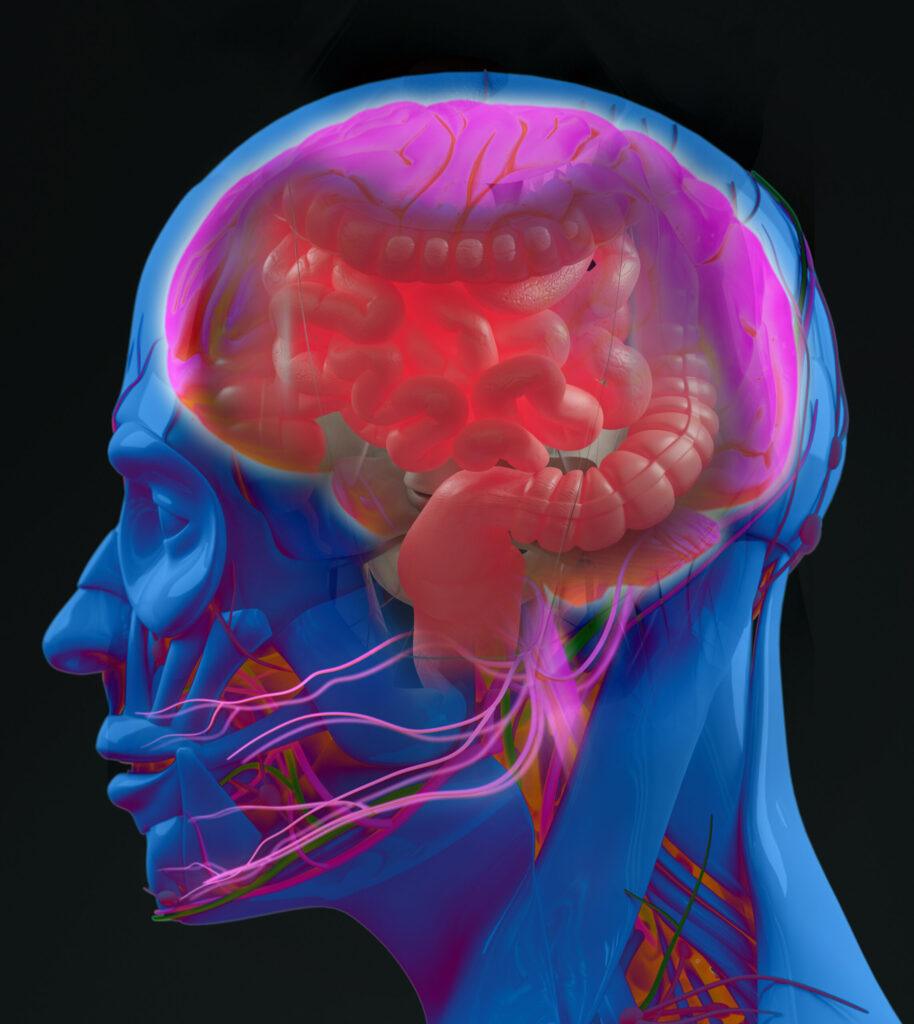
A healthy diet can decrease the risk of obesity, but did you know it can also affect our mental health? Physical activity and sleep are well-established factors that impact our mental health and mood, but what about food? This post will discuss how what we eat can impact our mental health. We will also look at what we can do today to be healthier, both in our gut and in our minds!
How the Gut “Talks”
In our gut, there are microorganisms such as bacteria that live there and affect our health. The gut-brain axis is a pathway that explains how our gut microbiota can influence our thoughts, emotions, and behaviour. (1) In return, the brain can send signals back to the gut to change bacteria, rate of bowel movements, and more.
Chronic stress and Western-style diets can increase inflammation in the gut, leading to gastrointestinal distress, anxiety, and depression. (2,3) In comparison, a healthy diet can increase certain gut bacteria that make and release neurotransmitters such as serotonin, a “happy hormone”. (4) The message is that what we eat can affect how we feel! (5)
When we adopt a healthy diet, we can reduce the risk of mental health problems. (2) However, more research is still needed on using food as a treatment for conditions like autism, Parkinson’s disease, and anxiety. (6,7) The quantity and quality of the current studies in this area are limited, so there are no evidence-based food recommendations for the treatment of these conditions yet.
Try a healthy diet pattern
So what type of foods is research pointing to? The evidence suggests that a healthy, Mediterranean-style diet is more beneficial than a Western-style one. (8) A Western-style diet includes eating a high amount of processed foods, added sugars and salt, red meats, and saturated fat while eating a low amount of fruit and vegetables. Following the Canadian Food Guide (2019) can also help reduce depressive symptoms.
Following a Mediterranean-style diet pattern means:
- More fruits and vegetables
- More legumes and pulses (eg, lentils, chickpeas, etc)
- More whole-grain products (eg, quinoa, whole-grain pasta/bread, etc)
- Limiting red meat and processed foods
- Substituting saturated fat (eg, butter) with unsaturated fats (eg, olive oil)
Working on having a positive relationship with food overall can also benefit our health. By CHANGE-ing our diet pattern today, we have the potential to see improvements in not only our physical health but mental health as well!
References
- Carabotti M, Scirocco A, Maselli Ma, Severi C. The gut-brain axis: interactions between enteric microbiota, central and enteric nervous systems. Annals of Gastroenterology. 2015;28(2):203-209.
- Bear TLK, Dalziel JE, Coard J, Roy NC, Butts CA, Gopal PK. The role of the gut microbiota in dietary interventions for depression and anxiety. Advances in Nutrition. 2020;11(4):890-907. doi: https://doi.org/10.1093/advances/nmaa016.
- Herselman MF, Bailey S, Bobrovskaya L. The Effects of Stress and Diet on the “Brain–Gut” and “Gut–Brain” Pathways in Animal Models of Stress and Depression. International Journal of Molecular Sciences. 2022;23(4):2013. doi: https://doi.org/10.3390%2Fijms23042013
- Terry N, Margolis KG. Serotonergic Mechanisms Regulating the GI Tract: Experimental Evidence and Therapeutic Relevance. Handb Exp Pharmacol. 2017;239:319–342. doi: https://doi.org/10.1007%2F164_2016_103
- Firth J, Gangwisch JE, Borsini A, Wootton RE, Mayer EA. Food and mood: how do diet and nutrition affect mental wellbeing? BMJ. 2020;369:m2382. doi: https://doi.org/10.1136%2Fbmj.m2382
- Baspinar B, Yardimci H. Gluten-Free Casein-Free Diet for Autism Spectrum Disorders: Can It Be Effective in Solving Behavioural and Gastrointestinal Problems? The Eurasian Journal of Medicine 2020;52(3):292-297. doi: https://doi.org/10.5152%2Feurasianjmed.2020.19230.
- Norwitz NG, Naidoo U. Nutrition as Metabolic Treatment for Anxiety. Frontiers in Psychiatry. 2021;12. doi: https://doi.org/10.3389%2Ffpsyt.2021.598119.
- Lăcătușu C, Grigorescu E, Floria M, Onofriescu A, Mihai B. The Mediterranean Diet: From an Environment-Driven Food Culture to an Emerging Medical Prescription. International Journal of Environmental Research and Public Health. 2019;16(6):942. doi: https://doi.org/10.3390%2Fijerph16060942.
Written by Karine Chan. Edited by Emma Wiwchar and Doug Klein. Photo from Shutterstock.